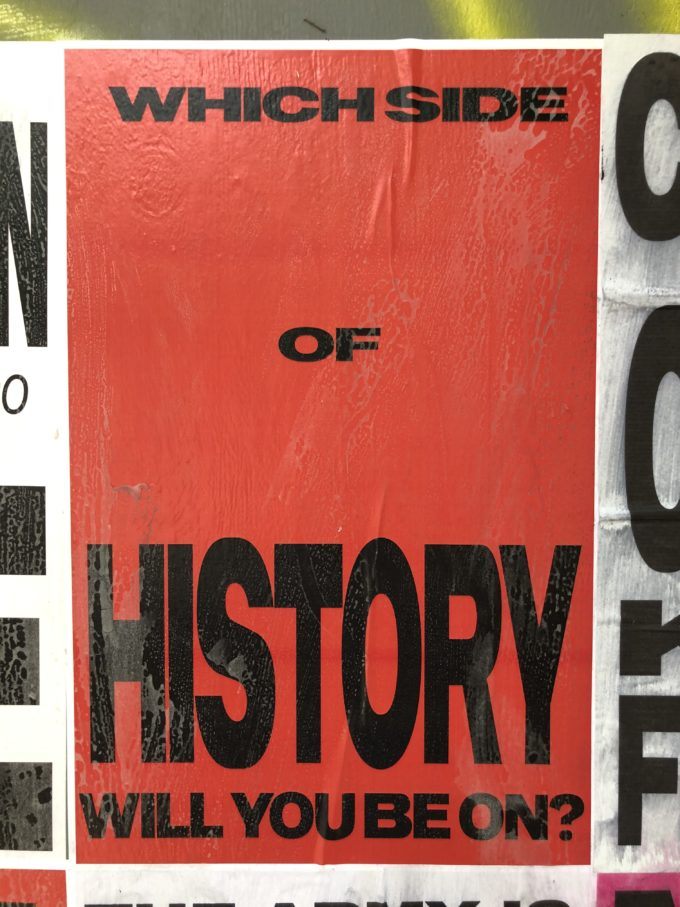The Collapse of the “Vital Center” and the Return of Politics
This is what politics looks like today: a president-elect in Mexico pushes big minimum wage hikes amid unsettled financial markets. In Budapest people queue to vote in local and European elections not for liberals to oppose Orban’s nationalist FIDESZ party, but for an alternative conservative party to it. In Germany the rightwing AfD swept elections along political geographic lines almost questioning whether Germany ever fully re-united in 1989. Meanwhile, the centrist faction of Labour sent Tories packing while simultaneously seeing the return to Parliament of Jeremy Corbyn and Nicholas Farage. More
The post The Collapse of the “Vital Center” and the Return of Politics appeared first on CounterPunch.org.


Photograph by Nathaniel St. Clair
This is what politics looks like today: a president-elect in Mexico pushes big minimum wage hikes amid unsettled financial markets. In Budapest people queue to vote in local and European elections not for liberals to oppose Orban’s nationalist FIDESZ party, but for an alternative conservative party to it. In Germany the rightwing AfD swept elections along political geographic lines almost questioning whether Germany ever fully re-united in 1989. Meanwhile, the centrist faction of Labour sent Tories packing while simultaneously seeing the return to Parliament of Jeremy Corbyn and Nicholas Farage.
Then there is France where big gains by the rightwing National Rally led Macron to make the riverboat gambler’s move to call snap parliamentary elections only to see Le Pen’s Rassemblement National’s hopes dashed this weekend when France’s Left prevailed on July 7th as Macron’s forces vacated spots for them to keep Le Pen down. And in the United States, the Democratic Party continues agonizing over whether to replace President Joe Biden, as by each day he comes to resemble the 1980s feeble gerontocracy of the Soviet Union.
It was not supposed to be this way, according to the neoliberals. Four decades ago Francis Fukuyama forecast a future absent doubts about market economies and political liberalism. The future was to be one of convergence, where central bankers were to operate independent of politics, and technocrats in International Financial Institutions would make adjustments to maximize equilibrium in order to keep the perpetual neoliberal motion machine humming along. New political ideas were thought unnecessary. Politics was out and the “Washington Consensus” was in. Few seemed to recognize or tolerate concerns that economies and societies are dynamic where contradictions can build up over time leading to calls for change.
But politics are back. The 2008 financial crisis proved to be a departure point from what John F. Kennedy’s advisor, Arthur Schlessinger Jr., referenced in the mid 1960s as the “Vital Center.” That center shifted from the social democratic New Deal order of the 1960s to neoliberalism with pretenses of still-existing social protections by the 1990s. In the 21stcentury, political alignments dissolved as electorate shifted “vote shopped,” often changing parties as each election left them ever more disappointed. One side would be elected only to be tossed out in the next election. Then came more anti-systemic challenges. Syriza in Greece rapidly rose to power in 2014 by opposing neoliberal austerity. In the spring of 2015 their finance minister, Yanis Varoufakis, positioned Greece to exercise the nuclear option and exit Greece from the euro. This was real change, but the risks were massive, and their prime minister, Alexis Tsipras, facing the threats from the European Central Bank to annihilate Greece’s economy, surrendered, thus leaving Europe’s left dispirited as Syriza was no longer representing real politics, but more akin to Barack Obama’s Democrats that were long on “hope” and short on “change.”
Meanwhile, in the US frustration with Barack Obama’s perceived do-nothing presidency and prospects for more of the same with the 2016 election running legacy candidates in the primaries (Hillary Clinton and Jeb Bush) resulted in powerful upwellings from below propelling forward Bernie Sanders on the left and Donald Trump on the populist right. Democrats cauterized and contained the Sanders challenge, but just barely. Trump hijacked the Wisconsin-based Republican party national in an ongoing battle for leadership of the GOP and now has near complete control over it.
Tectonic economic forces continued generating faults since, but increasingly with Europe’s right now proposing real policy change. A year after Eurocrats curbed Syriza in Greece, Nigel Farage’s Brexit Party organized neoliberals’ losers, e.g., the middle-class from the UK’s formerly industrialized Midlands, etc., and mobilized them to success in their referendum taking Britain out of the EU. Promised benefits failed to ensue, thus the “victory” was more a cultural protest, even though economic arguments were made advancing it. Meanwhile, Marie Le Pen’s political fortunes rose. And Fidesz in Hungary, to Law & Justice in Poland, to Giorgia Meloni’s Brothers of Italy political party, to the AfD in Germany (almost exclusively in the former GDR) and many others protest see the right on the march. By promising actual change on cultural issues and economic ones too, even if largely ineffectual, rejection of the “Vital Center” has grown more powerful.
In Mexico in this June 2nd’s election, Claudia Sheinbaum powered to a 61% victory as President on a left agenda of double-digit increases to the minimum wage and continuing her predecessor Andres Obrador’s plan to throw out Mexico’s 1600 federal appointed judges to be replaced by ones elected. Meanwhile, Mexico’s PRI which ruled the country for 79 years straight from 1929 to 2000 netted less than 10% of the vote. Alternately, a half year earlier, Argentinians embittered by decades of facing economic headwinds elected libertarian Javier Milei. In short, frustrated voters reject Margaret Thatcher’s old maxim of “There Is No Alternative” and increasingly reward candidates advancing cultural and/or policy change, regardless of effectiveness. Our still globalized (yet diminishing) world economy impedes agency at national levels. Thus, the political left (Mexico) and right (nearly everywhere else) has gained more traction with proposals for cultural change, especially on immigration, although there too demographic realities (e.g., need for labor) deliver constraints. That said, anger resulting from economic instability continues fueling discontent.
In short, the collapse of the once social democratic Vital Center has created a “Polanyi moment.” Jaques Delors’ “Social Europe” call in 1986 to square competitiveness in Europe with its Social Model, in practice led to ever-increasing economic liberalization marginalizing ever more of West Europe’s working classes. Bill Clinton and “reform” Democrats moved in tandem with this program. In East Europe, integration and migration threatened the national aspirations of its populations previously shackled under neo-Stalinist regimes. Absent fixes that deliver prosperity and stability to most people’s lives in West Europe, while permitting East Europeans national autonomy within democratic structures, we can expect greater volatility ahead in the EU. Meanwhile, in the Americas the political right has benefited in countries such as El Salvador and Argentina. The left commands attention in Mexico, while Trump and J.D. Vance look to represent the disaffected in the United States given no left alternative absent Bernie Sanders.
Politics returns with its next installment on July 15th. Contra Gil Scott-Heron’s assertion that the “revolution will not be televised,” one can tune into the Republican Party’s National Convention in Milwaukee, Wisconsin held from July 15-18th. The GOP will offer its mix of nationalism to the disaffected, yet simultaneously removing the last protections for working people with Project 2025’s program for privatizing Social Security and other services, while cutting taxes. Tune in for this preview of their revolution from the right coming for you.
The post The Collapse of the “Vital Center” and the Return of Politics appeared first on CounterPunch.org.
